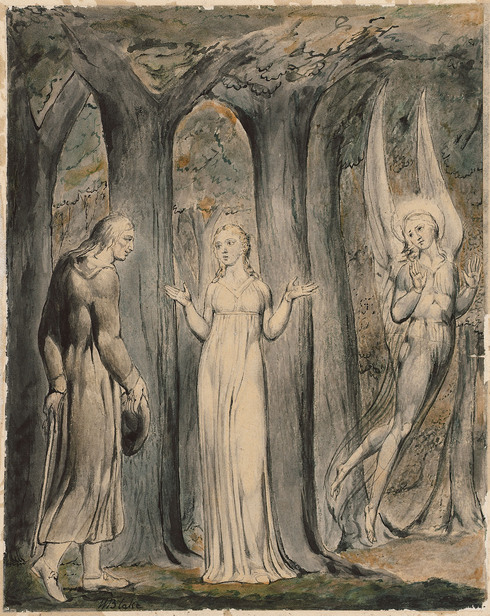 | |
|
John Milton
Line 61
"At last betakes him to this ominous Wood,
And in thick shelter of black shades imbowr'd, Excells his Mother at her mighty Art, Offring to every weary Travailer,
His orient liquor in a Crystal Glasse,
To quench the drouth of Phoebus, which as they taste
(For most do taste through fond intemperate thirst)
Soon as the Potion works, their human count'nance,
Th' express resemblance of the gods, is chang'd
Into some brutish form of Woolf, or Bear,
Or Ounce, or Tiger, Hog, or bearded Goat,
All other parts remaining as they were,
And they, so perfect is their misery, Not once perceive their foul disfigurement,
But boast themselves more comely then before
And all their friends, and native home forget
To roule with pleasure in a sensual sty."
The second image in the Butts set doesn't depart much from the Thomas set in composition. The emotions portrayed display subtle differences however. Perhaps the disguised Comus is more sinister and the Lady more inclined to accept the stranger's offer. The attendant Spirit is not holding the protective haemony but attempting to warn the Lady of the danger she faces. Blake may be attempting to develop greater tension through intensifying individual characteristics.
Through his power of enchantment Comus changes his victim's human countenance into that of a brutish animal. To Blake it was losing the ability to perceive the Divine Vision which led men to become degraded. Like Milton he viewed the human form as the Image of Himself by which God had crowned his creation. Milton's Comus casts the spell through which man loses the ability to see himself as human: the vehicle in which God resides. Milton included in his poem multiple themes; it can be read superficially as a defense of chastity, or more profoundly as a defense of man's innate humanity.
An example in Blake's Milton demonstrates a way in which Blake pictures man becoming locked in his mind by "envy of Living Form, even of the Divine Vision And of the sports of Wisdom in the Human Imagination."
Milton, Plate 3, (E 96)
"Mark well my words! they are of your eternal salvation:
Three Classes are Created by the Hammer of Los, & Woven
By Enitharmons Looms when Albion was slain upon his Mountains
And in his Tent, thro envy of Living Form, even of the Divine Vision
And of the sports of Wisdom in the Human Imagination
Which is the Divine Body of the Lord Jesus, blessed for ever.
Mark well my words. they are of your eternal salvation:
Urizen lay in darkness & solitude, in chains of the mind lock'd up
Los siezd his Hammer & Tongs; he labourd at his resolute Anvil
Among indefinite Druid rocks & snows of doubt & reasoning.
Refusing all Definite Form, the Abstract Horror roofd. stony hard.
And a first Age passed over & a State of dismal woe:"
.

No comments:
Post a Comment